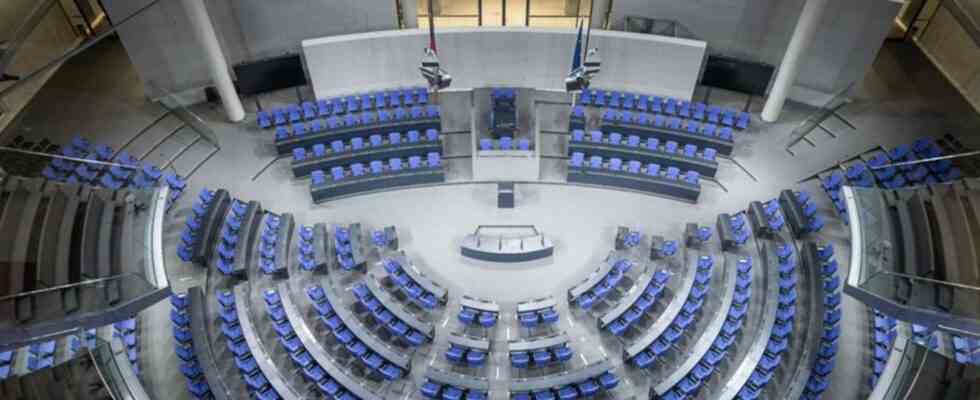houses of Parliament
No compromise evident in dispute over electoral reform
View of the plenary hall of the Bundestag in the Reichstag building. photo
© Michael Kappeler/dpa
Parliament is too big – there is broad agreement on this in Berlin. But not about how it should get back to its normal size. Now the deputies are debating on their own behalf.
In the dispute over the right way to downsize the Bundestag, there is no sign of a compromise. During the first discussion of proposals by the traffic light coalition and the opposition to reform the electoral law, the coalition stuck to its draft law on Friday. She accused the Union of its counter-proposal being too complicated and not suitable for ensuring a substantial reduction in the number of MPs from the current 736 MPs.
Konstantin Kuhle (FDP) praised the proposal, which he had presented together with politicians from the SPD and the Greens, as a measure against professional politics. He emphasized: “Parliamentary democracy is a temporary mandate.” Kuhle said to the CDU/CSU: “Let’s continue this conversation.” Despite general weaknesses, the union proposal also contains “some very good points”.
Target size of 598 MPs
The plans of the traffic light coalition are intended to ensure that the Bundestag shrinks back to its normal size of 598 MPs after the next election by abolishing overhang and compensation mandates. The Union, on the other hand, proposes a reduction in the number of constituencies from 299 to 270 constituencies.
“We want to pass our law in early March and hope for a broad parliamentary majority,” said the SPD parliamentary group’s domestic policy spokesman, Sebastian Hartmann, of the German Press Agency. Till Steffen (Greens) assured in the plenum that the Union would not stop them: “We’ll do it now.” Albrecht Glaser (AfD) said the traffic light proposal was very similar to a concept by his group on the 2020 electoral law reform. The left welcomed the traffic light proposal in principle.
The fact that the Bundestag has grown has to do with the differentiation of the party landscape and the changed voting behavior. Overhang mandates arise when a party wins more mandates from the first votes than it is entitled to based on the result of the second vote. The party may keep these additional mandates. The other parties receive compensatory mandates in return.
The left remained below the five percent hurdle in the last federal election and only got into parliament thanks to three direct mandates in the parliamentary group on the basis of the so-called basic mandate clause. The Union proposes that this clause should only apply to five direct mandates in the future.

